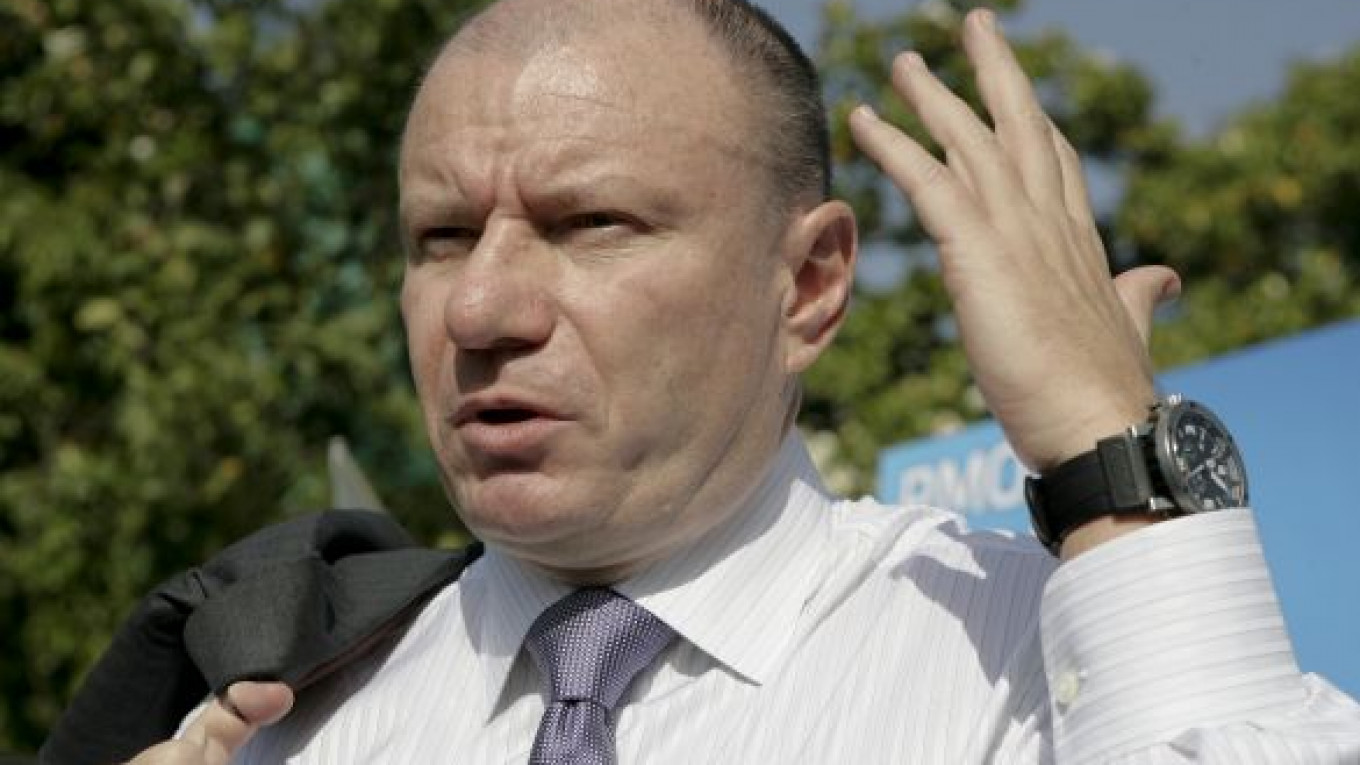Vladimir Potanin has become the largest shareholder in Norilsk Nickel. At a shareholders meeting on Friday, Interros could gain more seats than RusAl on the board of directors.
Since October last year, Interros has increased its stake in Norilsk from 25 percent to "about 30 percent," Potanin, president and owner of Interros, told Vedomosti. Interros began buying up shares on the market after it announced on Oct. 19 that it was terminating a cooperation agreement with RusAl on general principles for managing Norilsk Nickel. Potanin refused to name the amount spent on buying the shares.
The weighted average price of 5 percent of Norilsk shares on the London Stock Exchange from October to Feb. 4 (the cutoff date for participation in the extraordinary shareholders meeting) was $2.1 billion.
Interros does not need to offer to buy out other Norilsk shareholders, Potanin said, as long as his stake does not exceed 30 percent. Whether RusAl has increased its stake is uncertain; a company spokesman did not respond to questions.
Interros and RusAl signed an agreement on managing Norilsk in November 2008, ending an almost yearlong battle for control over the company. The sides agreed to lower their stakes to 25 percent (at the peak of the conflict, Interros' stake reached 29.7 percent), support parity within the board of directors (four representatives from each side) and choose an independent chairman, Alexander Voloshin, representing the state.
But last year, following Norilsk's annual shareholders meeting, RusAl accused Interros of violating the agreement because Voloshin did not get elected to the board. Interros countered that it was obligated to vote for Voloshin as chairman of the board, but that RusAl needed to make sure he became a board member.
RusAl attempted to elect a new board at an extraordinary shareholders meeting in October, but that was just after Interros had announced it was terminating their agreement. At that time, Interros did not own 30 percent of Norilsk, Potanin said, but its stake was enough to, together with Norilsk itself and Metalloinvest, prevent a new board from being elected.
For the upcoming meeting, Potanin has prepared more diligently, raising Interros' stake to almost 30 percent. If the winning percentage of votes is the same as at last year's meeting — 5.2 percent, with 92 percent of votes present — then Interros will have five out of 13 seats on the board.
Norilsk itself can elect two representatives — based on the 7.2 percent stake its subsidiary Corbiere bought from parent company shareholders and the 8 percent stake to be sold to the trading company Trafigura. (The company has not commented on whether that deal has gone through.)
The size of RusAl's current stake is uncertain. If it's the same as the last time it was disclosed — on April 30 — then it's 25.13 percent, enough for RusAl to guarantee election of four board members, among whom should be Voloshin and Sberbank representative Oskar Ratsin (a condition of a $4.5 billion loan Sberbank provided to RusAl). Then there will only be one seat for an independent director.
Potanin told Vedomosti that he considers Voloshin to be a neutral figure and would not be against his heading the board.
Under this scenario, even electing Voloshin would not bring the sides closer to reconciliation, VTB Capital analyst Alexander Pukhayev said. After all, RusAl would not be able change the management and gain influence over Norilsk's activities without first agreeing with Interros, he said.
Nevertheless, after electing the new board, the conflict will progress to the "negotiation stage," Pukhayev said.
Norilsk and Metalloinvest spokespeople declined to comment.
A Message from The Moscow Times:
Dear readers,
We are facing unprecedented challenges. Russia's Prosecutor General's Office has designated The Moscow Times as an "undesirable" organization, criminalizing our work and putting our staff at risk of prosecution. This follows our earlier unjust labeling as a "foreign agent."
These actions are direct attempts to silence independent journalism in Russia. The authorities claim our work "discredits the decisions of the Russian leadership." We see things differently: we strive to provide accurate, unbiased reporting on Russia.
We, the journalists of The Moscow Times, refuse to be silenced. But to continue our work, we need your help.
Your support, no matter how small, makes a world of difference. If you can, please support us monthly starting from just $2. It's quick to set up, and every contribution makes a significant impact.
By supporting The Moscow Times, you're defending open, independent journalism in the face of repression. Thank you for standing with us.
Remind me later.






